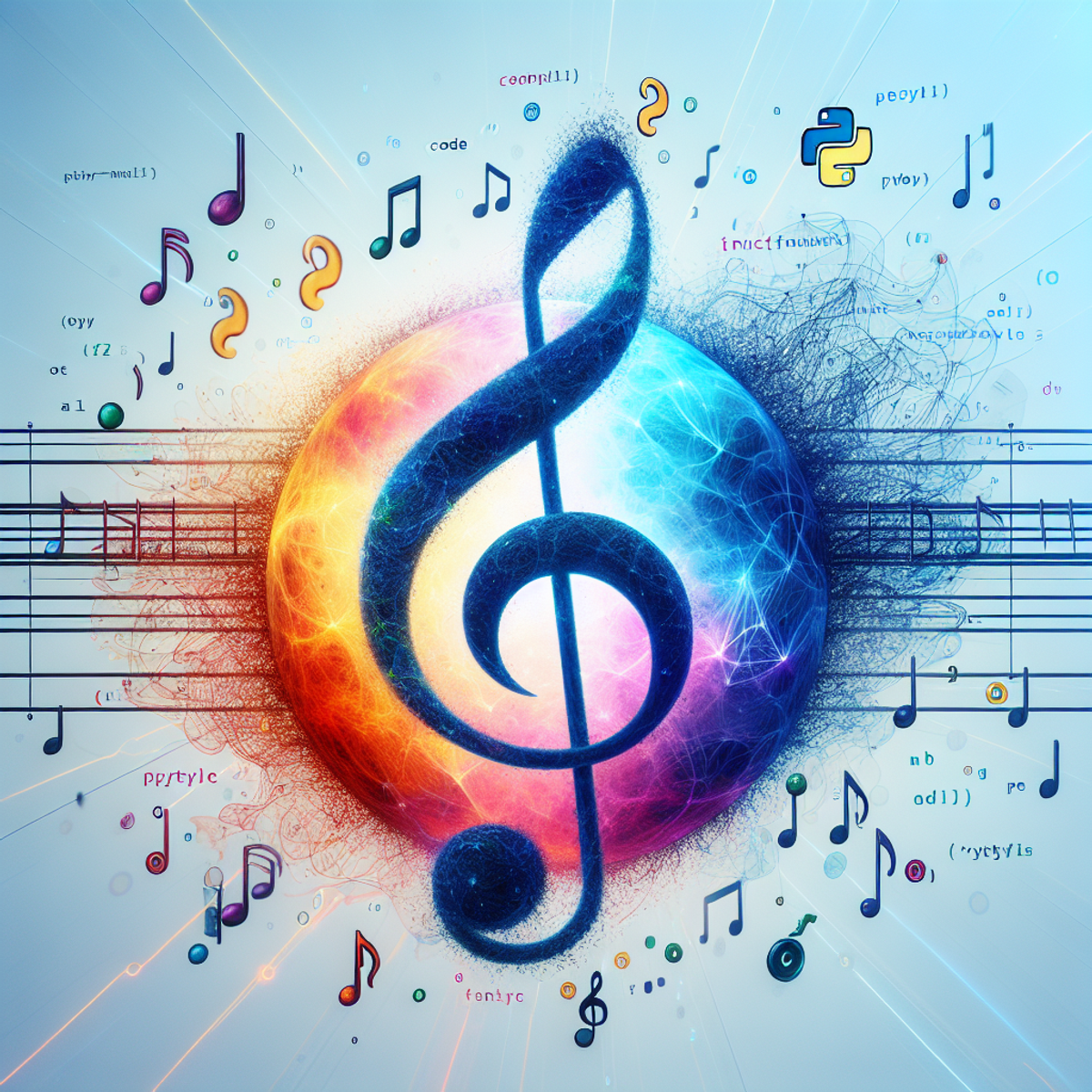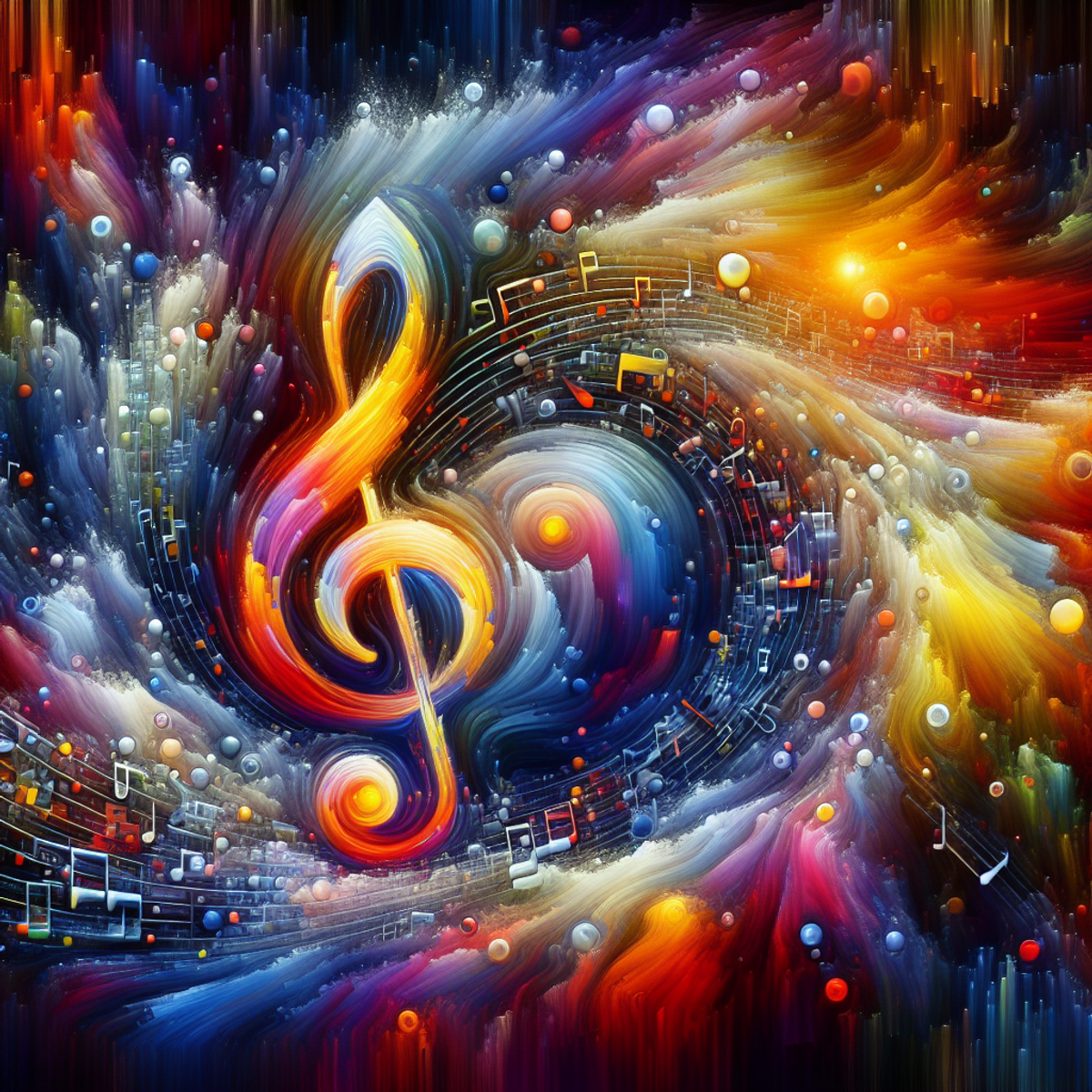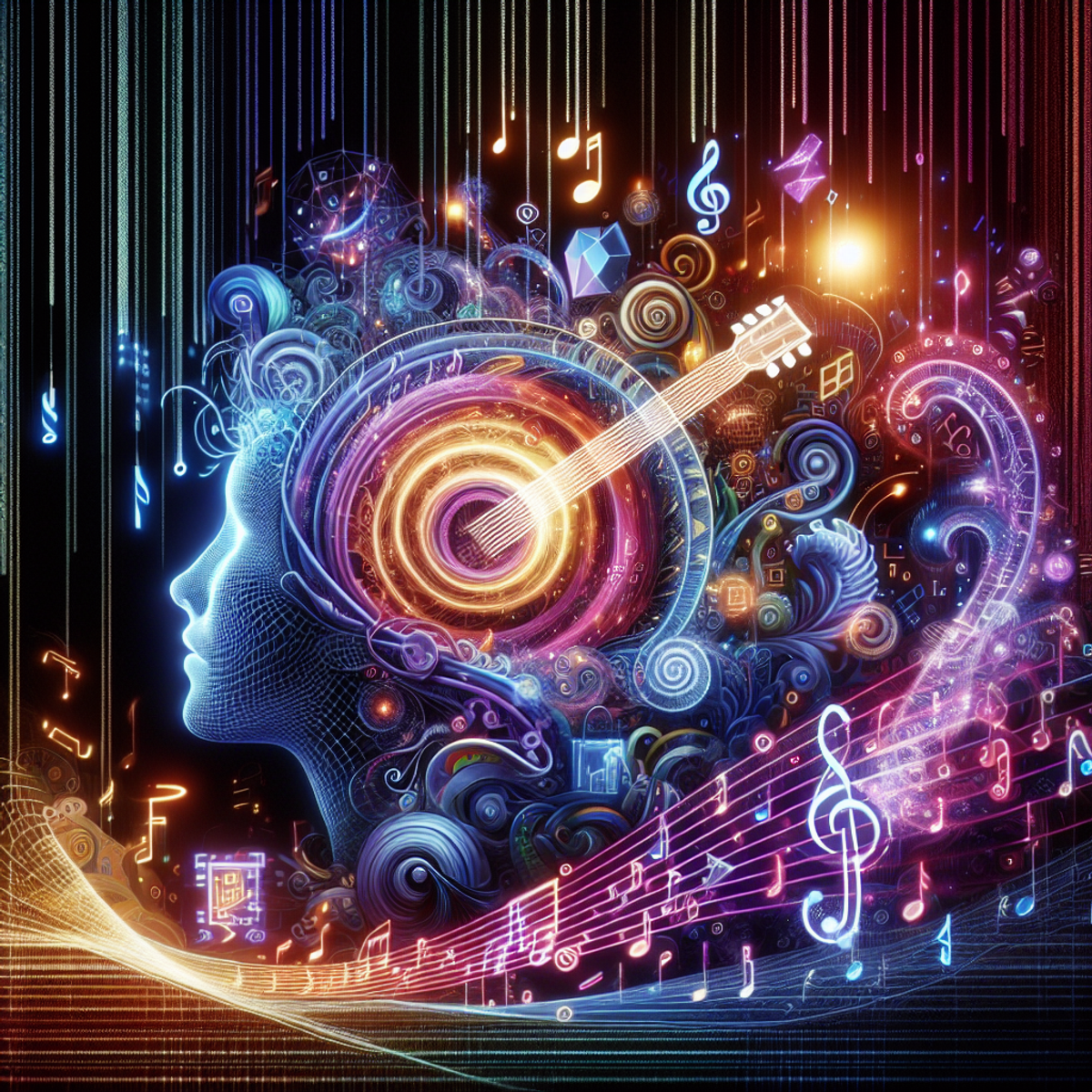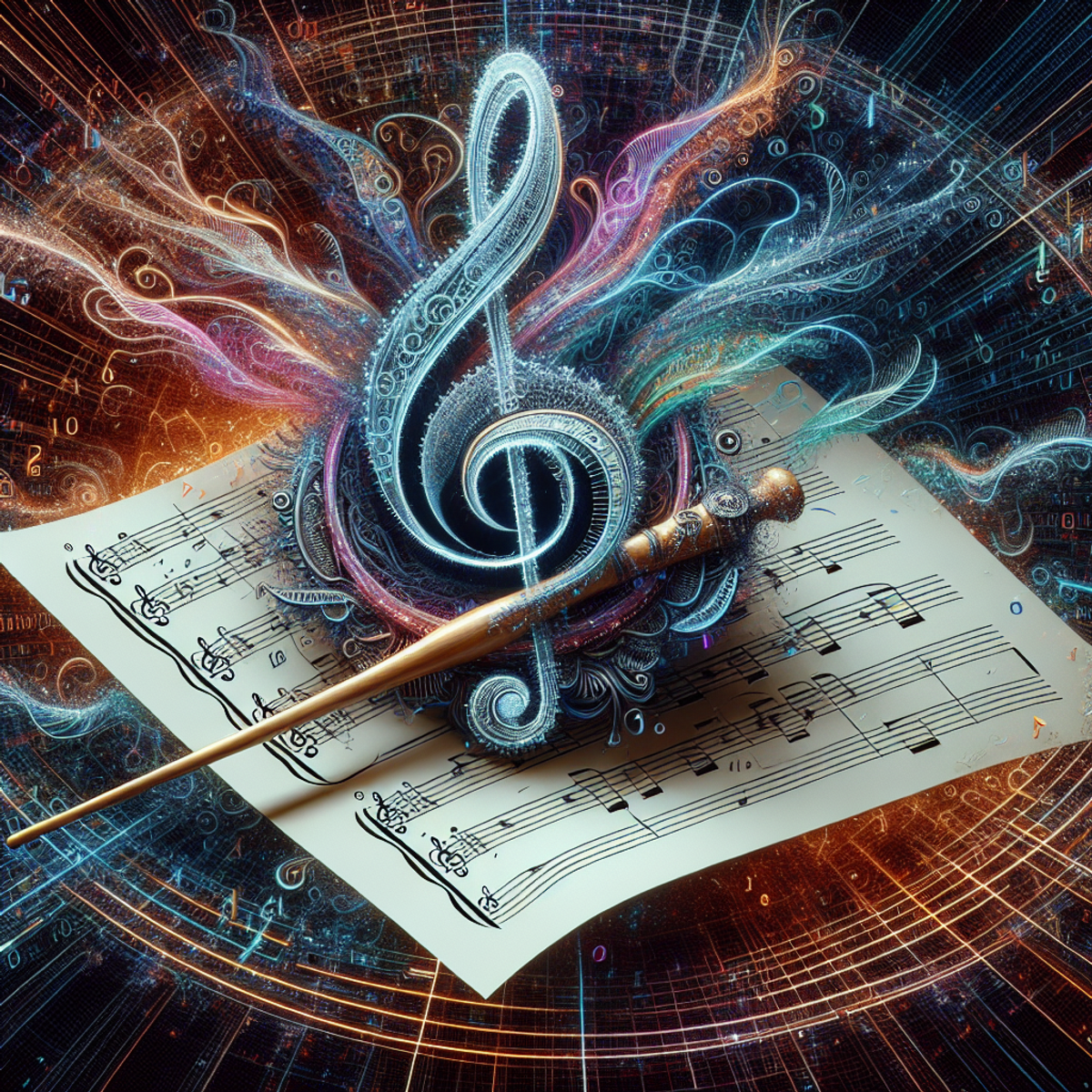Python and Music Composition AI

Python and Music Composition AI
Introduction
AI has revolutionized various industries, and the world of music composition is no exception. With the integration of Python and artificial intelligence techniques, music composition AI has emerged as a powerful tool for generating new and innovative music compositions. In this article, we will explore the significance of Python in music composition AI and delve into the exciting possibilities it offers.
Brief Explanation of Music Composition AI
Music composition AI involves using machine learning and artificial intelligence algorithms to generate original musical compositions. By analyzing vast amounts of musical data, these algorithms learn patterns, structures, and styles inherent in different genres and artists' works. With this knowledge, they can create new compositions that imitate or reinvent existing musical styles.
Significance of Python in Music Composition with AI
Python has become the language of choice for many developers and researchers working in the field of artificial intelligence. Its simplicity, versatility, and extensive libraries make it ideal for implementing complex algorithms and handling large datasets. When it comes to music composition AI, Python offers several advantages:
- Ease of Use: Python's clean syntax and readability make it accessible to both beginners and experienced developers. Its simplicity allows composers without extensive programming experience to experiment with AI tools.
- Vast Ecosystem: Python boasts a rich ecosystem of libraries that facilitate music analysis, manipulation, and generation. These libraries provide pre-built functions and algorithms, saving time and effort in developing a composition AI system from scratch.
- Music Analysis: Python libraries such as music21 enable composers to analyze musical elements like melody, harmony, rhythm, and structure programmatically. This analysis can inform the generation process by capturing specific characteristics of different musical genres or artists.
- Creative Generation: Libraries like Magenta offer creative music generation capabilities using deep learning models. These models can generate melodies, harmonies, basslines, or even complete compositions based on learned patterns from training datasets.
Python's versatility and robustness make it an ideal language for implementing AI techniques in music composition. Its wide adoption in the industry ensures that developers have access to a large community, constant updates, and extensive resources to support their projects.
In the next section, we will explore the Python libraries used in music composition AI, providing an overview of their features and functionalities. By leveraging these libraries, composers can tap into the power of AI to enhance their creative process and push the boundaries of musical expression.
Python and Music Composition AI
Python has become a powerful tool for using artificial intelligence (AI) in music composition. Its flexibility and extensive libraries make it an excellent choice for creating music with AI.
Python's Role in Music Composition
- Versatile Programming Language: Python's flexibility and readability make it suitable for implementing complex algorithms used in AI music composition.
- Extensive Libraries: Python offers a wide range of libraries specifically designed for music analysis, manipulation, and generation using AI techniques. For instance, the python-libraries provide comprehensive functionality for working with symbolic music data, making them valuable resources for AI-assisted composition.
- Integration with Machine Learning: Python seamlessly integrates with machine learning frameworks, allowing the development of sophisticated models for music composition.
Application of AI Techniques
- Pattern Recognition: Python enables the implementation of AI algorithms to recognize musical patterns and structures within datasets, facilitating the generation of new compositions.
- Algorithmic Composition: Through Python, composers can leverage AI to create music autonomously or as a collaborative tool to enhance their creative process.
Examples of Python Applications in Music Composition AI
- Magenta Project: Google's Magenta project provides a suite of Python libraries for music and art generation. It offers tools for music composition, performance, and data analysis, empowering musicians and researchers to explore AI-driven creativity.
- Music21 Library: The Music21 library enables users to analyze, manipulate, and generate musical scores using Python. It provides comprehensive functionality for working with symbolic music data, making it a valuable resource for AI-assisted composition.
Advantages of Using Python in Music Composition AI
- Community Support: Python has a large community of developers and researchers who actively contribute to the advancement of AI applications in music composition. This support network fosters collaboration and knowledge sharing.
- Interdisciplinary Integration: Python is widely used across different fields, making it easier for musicians, data scientists, and software engineers to collaborate on innovative AI-driven compositions. It also provides a gateway to learn other skills relevant to music composition AI, such as AI techniques.
In summary, Python plays a crucial role in using AI techniques for music composition. Its extensive libraries and seamless integration with machine learning frameworks give composers the tools they need to push the boundaries of musical creativity.
Python Libraries for Music Composition AI
Python offers a wide range of libraries that are specifically designed for music composition AI. These libraries provide the necessary tools and functions to analyze, manipulate, and generate music using artificial intelligence techniques. Two popular libraries in this field are music21 and Magenta.
Music Analysis and Manipulation with music21
music21 is a powerful Python library that allows for the analysis and manipulation of music. It provides a comprehensive set of tools for working with musical notation, MIDI files, and other musical representations. Here are some key features of music21:
- Music notation: With music21, you can work with musical scores in various formats such as MIDI, MusicXML, and LilyPond. It allows you to read, write, and modify musical notations programmatically.
- Music analysis: The library provides advanced algorithms for analyzing musical structures like chords, melodies, and harmonies. It can extract information from existing compositions and provide insights into different aspects of the music.
- Music manipulation: You can use music21 to manipulate musical elements such as transposing, harmonizing, or reordering notes. It allows you to experiment with different variations of a musical composition.
Creative Music Generation using Magenta
Magenta is an open-source Python library developed by Google that focuses on creative music generation using machine learning techniques. It provides pre-trained models and tools to create new compositions based on existing musical patterns. Here are some highlights of Magenta:
- Deep learning models: Magenta offers a collection of pre-trained deep learning models that can generate melodies, harmonies, drum patterns, and even complete songs. These models are trained on large datasets of existing compositions to learn the underlying patterns.
- Musical style transfer: With Magenta, you can explore the concept of style transfer in music. It allows you to apply the characteristics of one musical style to another, creating unique compositions that blend different genres or influences.
- Interactive composition: The library enables real-time interaction with the generated music. You can experiment with changing parameters and receive immediate feedback on the resulting compositions.
Both music21 and Magenta provide extensive documentation, tutorials, and examples to help users get started with music composition AI. These libraries empower musicians, composers, and researchers to explore new possibilities in music creation by leveraging the power of Python and artificial intelligence.
By utilizing these libraries, musicians can:
- Analyze existing compositions
- Experiment with different musical elements
- Generate new melodies and harmonies
- Blend different styles to create unique and innovative musical pieces
The combination of Python's flexibility and the advanced machine learning techniques offered by these libraries opens up exciting opportunities for creativity in the field of music composition.
Training Algorithms on Music Datasets for Composition
The use of Python in music composition AI involves training machine learning algorithms on music datasets to generate new compositions. This section explores the process of training algorithms, capturing musical patterns, and considerations for utilizing different types of music datasets.
Training Machine Learning Algorithms on Music Data
Training machine learning algorithms for music composition involves feeding them with large volumes of musical data to learn patterns, structures, and styles. Python provides a versatile platform for implementing machine learning models and algorithms due to its extensive libraries such as TensorFlow and PyTorch. These libraries enable the development and training of complex neural networks and deep learning models that can analyze and interpret musical patterns from datasets.
Capturing Musical Patterns Through Dataset Preparation
Preparing music datasets for algorithmic training is a crucial step in the composition process. It involves curating a diverse collection of musical pieces, representing various genres, styles, and eras. The dataset should encompass a wide range of musical elements such as melody, harmony, rhythm, and instrumentation. Python's data manipulation capabilities facilitate the preprocessing and organization of these diverse musical elements into formats suitable for algorithmic analysis.
The Role of Audio Analysis in Algorithmic Composition
In order to train machine learning algorithms effectively, it is imperative to perform thorough audio analysis on the music datasets. This process allows composers to identify key features within the audio files that are essential in capturing the desired musical patterns. By leveraging Python's rich libraries and tools, such as those discussed in this article on audio deep learning, composers can simplify the sound classification process during dataset preparation.
Considerations for Utilizing Different Types of Music Datasets
When utilizing music datasets for algorithmic composition, it is essential to consider the diversity and quality of the data. Datasets can vary widely in terms of size, genre representation, audio quality, and metadata availability. Python's data processing capabilities enable composers to clean, filter, and augment datasets to ensure that the trained algorithms capture a broad spectrum of musical characteristics. Additionally, Python’s integration with web scraping tools allows access to vast online repositories of musical data, expanding the potential scope of training datasets.
Python plays a pivotal role in facilitating the training of machine learning algorithms on music datasets for composition purposes. Its robust libraries and data processing capabilities provide composers with powerful tools to capture diverse musical patterns and create innovative compositions.
AI Music Composition Tools
When it comes to AI-assisted music composition, there are several popular tools that have gained recognition for their innovative approach to generating music using artificial intelligence. These tools offer unique features and functionalities, empowering composers and musicians to explore new creative possibilities.
Exploration of Popular Tools for AI-Assisted Music Composition
The realm of AI music composition tools encompasses a diverse range of software applications designed to facilitate the creation of original musical pieces. These tools leverage machine learning algorithms and deep learning techniques to analyze musical patterns, harmonies, and structures, ultimately generating compositions that resonate with human emotion.
Key Features and Functionalities to Look for in an AI Music Tool
When evaluating AI music composition tools, it is essential to consider the key features and functionalities that contribute to their effectiveness in creating compelling music. Some essential aspects to look for in these tools include:
- Musical Style Customization: The ability to tailor the musical style and genre according to specific preferences and requirements.
- Real-Time Collaboration: Features that enable seamless collaboration between composers, musicians, and AI systems in real time.
- Scalability: The capacity of the tool to accommodate diverse musical inputs and produce coherent compositions across varying lengths and complexities.
- Interactive Interface: Intuitive user interfaces that foster an engaging and dynamic creative process.
AIVA: Empowering Composers with Advanced AI Techniques
AIVA is a prominent AI music composition tool renowned for its advanced capabilities in generating orchestral compositions. Leveraging deep learning algorithms, AIVA can craft intricate musical arrangements that evoke profound emotional depth. Its ability to adapt to user input and refine compositions based on specific preferences makes it a valuable asset for composers seeking to explore the intersection of human creativity and artificial intelligence.
Amper Music: Redefining the Creative Process through AI-Generated Soundtracks
Amper Music stands out as a transformative platform that empowers creators to develop custom soundtracks using AI-generated compositions. By leveraging machine learning models, Amper Music provides users with a rich library of musical elements, enabling them to construct unique soundscapes tailored to various media productions. Its intuitive interface and adaptive functionality make it a versatile tool for enhancing the creative process across multiple artistic domains.
As the landscape of AI music composition continues to evolve, these cutting-edge tools exemplify the potential of technology in augmenting human creativity. With their diverse capabilities and innovative approaches, they pave the way for new artistic expressions while redefining the traditional paradigms of music composition.
The Impact of Python and Machine Learning on the Music Industry
Python and machine learning have had a profound impact on the music industry, revolutionizing the music writing process and transforming recording techniques through AI-assisted composition and performance. Let's explore the significant contributions these technologies have made:
Revolutionizing the Music Writing Process with Python and Machine Learning
- Enhanced Efficiency: Python and machine learning algorithms have streamlined the music writing process, allowing composers to generate high-quality compositions more efficiently. By training algorithms on vast amounts of musical data, these tools can analyze patterns and structures to generate original melodies, harmonies, and rhythms.
- Exploration of New Musical Styles: With the help of Python and machine learning, musicians can experiment with new musical styles and genres. By analyzing existing music data, algorithms can identify unique characteristics and create compositions that blend different styles or push boundaries by introducing novel elements.
- Collaborative Composition: Python-based AI tools enable collaboration between human composers and machine-generated music. Composers can use AI-generated suggestions as a starting point for their compositions, incorporating machine-generated ideas into their creative process. This collaboration between humans and machines opens up new possibilities for artistic expression.
Transforming Recording Techniques through AI-Assisted Composition and Performance
- Dynamic Accompaniment: Python-powered AI systems can provide dynamic accompaniment for live performances. By analyzing the input from live musicians in real-time, these systems generate complementary musical phrases that seamlessly blend with the performer's style. This creates an interactive experience where the AI adapts to the musician's performance, enhancing creativity during live shows.
- Smart Mixing and Mastering: Machine learning algorithms can assist in the mixing and mastering process by automatically adjusting audio levels, enhancing clarity, reducing noise, and optimizing sound quality. These tools save time for audio engineers while improving the overall sonic experience of the final product. For instance, open-source libraries like audio development tools provide additional resources for audio engineers to explore.
- Personalized Listening Experience: Python-based machine learning algorithms can analyze listeners' preferences and behaviors to create personalized playlists and recommendations. By understanding individual listening patterns, these algorithms suggest music that aligns with the listener's taste, introducing them to new artists and genres. This level of personalization is also seen in other audio-related fields such as podcasting, where accurate transcriptions using AI technologies can greatly enhance the listening experience. Platforms like Reddit have discussions around such advancements.
- Real-Time Composition and Performance: Python-powered AI systems can generate music in real-time during performances. This allows musicians to interact with the AI system, creating unique compositions on the fly. These real-time performances blur the lines between composition and improvisation, leading to captivating live experiences.
The integration of Python and machine learning has transformed various aspects of the music industry. From the composition process to live performances and audio production, these technologies have provided new tools for creativity, efficiency, and personalization.
By harnessing the power of Python and machine learning, musicians can explore new musical territories, collaborate with AI systems, and deliver exceptional experiences to their audience. As technology continues to advance, we can expect further innovations in music composition, performance, and production that
Ethical Implications of AI in Music Composition
The integration of AI into music composition brings about ethical considerations that prompt reflection on the impact and implications of these technological advancements. As AI continues to play a significant role in music creation, it is essential to explore the ethical concerns surrounding its use.
Exploring Ethical Concerns
1. Intellectual Property and Originality
- The use of AI in music composition raises questions about the originality and ownership of the created music. Who holds the rights to music generated by AI? How does this affect copyright laws and intellectual property rights?
2. Human Creativity vs. AI-generated Content
- There is an ongoing debate regarding the authenticity and artistic value of music created by AI. Does AI-generated music possess the same emotional depth and creativity as human-composed music? How does the prevalence of AI-created content impact the perception of artistic expression?
3. Cultural Appropriation
- When AI algorithms are trained on diverse musical styles and genres, there is a risk of cultural appropriation. How can we ensure that AI-generated music respects the cultural heritage and traditions it draws inspiration from?
4. Transparency and Accountability
- The opacity of AI algorithms raises concerns about transparency in music creation. How can we ensure accountability for the output produced by AI systems? Should there be disclosure requirements when AI-generated music is released to the public?
5. Displacement of Human Musicians
- The increasing capabilities of AI in creating high-quality compositions may raise concerns about potential job displacement for human musicians. How can we balance the benefits of efficiency with preserving opportunities for human creativity in music composition?
Navigating Ethical Dilemmas
As we navigate the ethical dilemmas associated with AI in music composition, it is crucial to engage in open dialogue and collaboration across various stakeholders, including musicians, technologists, legal experts, ethicists, and industry regulators. Addressing these ethical implications requires a multidisciplinary approach that considers legal frameworks, cultural sensitivities, and artistic integrity.
The evolving landscape of AI in music composition calls for proactive measures to establish guidelines and best practices that promote ethical usage while fostering innovation. By fostering an inclusive conversation about the ethical dimensions of AI-generated music, we can work towards a harmonious integration of technology and creativity that respects artistic integrity and cultural diversity.
The exploration of ethical implications surrounding AI in music composition underscores the need for ongoing evaluation and adaptation as technology continues to shape the future of musical expression. These concerns are not limited to the entertainment industry alone; they extend to various aspects of our digital lives as highlighted in this Pew Research report.
The Future Intersection of Python, Machine Learning, and Music Composition
The future of music composition is being significantly shaped by the intersection of Python, machine learning, and artificial intelligence. As technology continues to advance, these tools are revolutionizing the creative process in the music industry and opening up new possibilities for composers and musicians.
Evolving Role of Python
Python has become a cornerstone in the development of AI applications, including music composition. Its versatility and extensive libraries make it an ideal choice for developers and researchers working on innovative music composition techniques. In the future, Python is expected to play an even more prominent role in enhancing the capabilities of AI-driven music composition systems.
Advancements in Machine Learning
The rapid advancements in machine learning algorithms are poised to bring about transformative changes in music composition. As algorithms become more sophisticated and capable of understanding complex musical patterns, they will enable the generation of highly nuanced and original musical pieces. Python's role in facilitating the implementation and deployment of these advanced machine learning models will be pivotal to their success.
Integration of Music Theory and AI
One of the most exciting prospects for the future is the integration of traditional music theory with AI-driven composition techniques. Python's ability to handle complex data structures and algorithms makes it an ideal platform for developing AI systems that can comprehend and apply intricate musical rules and conventions. This integration has the potential to yield compositions that not only exhibit creativity but also adhere to established musical principles.
Democratization of Music Creation
With the continued advancement of Python-based AI tools for music composition, there is a growing trend towards democratizing the creation of music. As these technologies become more accessible and user-friendly, they empower a wider range of individuals to engage in musical expression and composition. This shift has the potential to diversify the landscape of music creation by enabling non-traditional musicians to harness the power of AI to produce compelling works.
Collaborative Composition Platforms
In the future, we can anticipate the emergence of collaborative music composition platforms driven by Python-powered AI systems. These platforms will facilitate seamless collaboration between human composers and AI algorithms, allowing them to co-create intricate musical arrangements. Such collaborative endeavors have the potential to yield compositions that blend human emotion and creativity with the computational prowess of AI.
Enhanced Personalization in Music
As Python-based AI continues to evolve, it is expected to enable highly personalized music composition experiences. By analyzing vast amounts of user data and preferences, AI systems can tailor compositions to align with individual artistic styles and audience preferences. This level of personalization has the potential to revolutionize how music is created, consumed, and appreciated on a global scale.
The intersection of Python, machine learning, and music composition represents a paradigm shift in how we approach musical creativity. The evolving capabilities of these technologies hold great promise for shaping the future landscape of music composition, fostering innovation, accessibility, collaboration, and personalized artistic expression.
Conclusion
Through the power of Python and AI, we are witnessing a transformation in the way music is composed. From automated composition to collaborative platforms and personalized experiences, these advancements are redefining the boundaries of human creativity. As we embrace this new era, it is crucial to strike a balance between the capabilities of AI and the unique essence of human artistry. By leveraging Python's versatility and machine learning's analytical prowess, we can embark on a journey towards a harmonious coexistence of man and machine in the realm of music composition.By embracing this balance, we can unlock a world of musical possibilities that were once unimaginable. Python and AI are not here to replace musicians, but rather to augment their creativity and expand the horizons of musical expression. As we navigate this uncharted territory, it is essential to remain open-minded, adaptable, and ethically conscious. Through responsible utilization of these technologies, we have the potential to nurture a thriving ecosystem where human ingenuity and AI's computational power intertwine, creating a symphony of innovation and artistic brilliance.
FAQs (Frequently Asked Questions)
What is the significance of Python in music composition with AI?
Python plays a significant role in music composition with AI by providing a versatile and powerful programming language for implementing artificial intelligence techniques to generate, analyze, and manipulate music compositions.
What does the 'Python and Music Composition AI' content explore?
The 'Python and Music Composition AI' content explores the applications of Python in generating music compositions using artificial intelligence techniques.
What are some of the Python libraries used in music composition AI?
Some of the Python libraries used in music composition AI include music21 and Magenta, which are utilized to analyze, manipulate, and generate music compositions.
How are training algorithms used on music datasets for composition purposes?
Training algorithms are used on music datasets to capture musical patterns and prepare the data for machine learning techniques aimed at generating music compositions.
What are some popular AI music composition tools mentioned in the content?
Some popular AI music composition tools mentioned in the content include AIVA, Amper Music, Beatoven, and Ecrett Music, each offering unique features and functionalities for AI-assisted music composition.
How is Python and machine learning impacting the music industry?
Python and machine learning are revolutionizing the music writing process and transforming recording techniques through AI-assisted composition and performance, thereby impacting the music industry significantly.
What ethical implications are associated with AI in music composition?
There are ethical concerns surrounding the use of AI in music creation, which need to be explored and addressed to ensure responsible and ethical use of technology in this context.
What does the future hold for the intersection of Python, machine learning, and music composition?
Looking ahead, Python is expected to play an evolving role in shaping the future of music composition through its integration with machine learning techniques and AI advancements.
As machine learning algorithms continue to improve and become more sophisticated, the potential for AI-driven music composition becomes even greater. Python, with its versatility and extensive libraries, is likely to remain a prominent language in this field. However, as we navigate this exciting intersection of technology and art, it's crucial to consider the ethical implications and ensure that AI is used as a tool to enhance human creativity rather than replace it.







Comments
Post a Comment